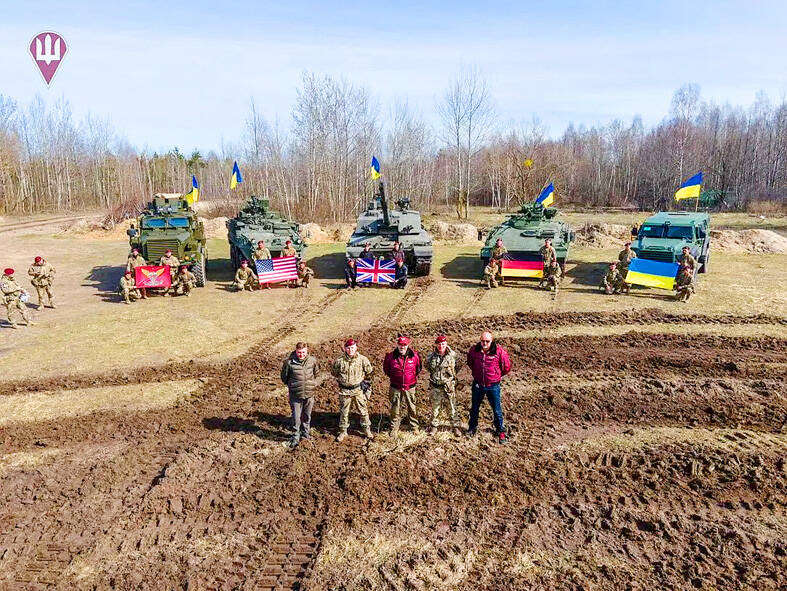Germany and Britain have delivered Western heavy tanks to Ukraine, officials said on Monday, providing a key infusion of armored firepower that would aid Kyiv’s battle against invading Russian troops.
The tanks — long an item on Ukraine’s military equipment wish list — were promised to Kyiv earlier this year and have arrived in time for an expected spring offensive by Ukraine’s forces.
As Ukraine gains conventional firepower, the Kremlin vowed to follow through on a plan announced by Russian President Vladimir Putin to deploy tactical nuclear weapons in neighboring Belarus, an initiative which has drawn widespread criticism.

Photo: Reuters / Press Service of the Defense Ministry of Ukraine
German Chancellor Olaf Scholz told journalists on Monday that Berlin had provided “very modern” Leopard battle tanks to Kyiv, with the German Ministry of Defense later saying 18 were delivered.
“Our tanks have made it into the hands of our Ukrainian friends as promised and on time,” German Minister of Defense Boris Pistorius said in a statement.
They are joined by Challenger tanks from Britain, a spokeswoman for the Ukrainian Ministry of Defense said.
Ukrainian Minister of Defense Oleksiy Reznikov had said earlier that he inspected a “new addition” to the nation’s forces — Challenger tanks as well as Germany’s Marder infantry fighting vehicles, plus Cougar armored trucks and Stryker armored personnel carriers from the US.
“A year ago, no one would have thought that our partners’ support would be so strong,” Reznikov wrote on Facebook.
In Moscow, Kremlin spokesman Dmitry Peskov said Western criticism of Putin’s tactical nuclear weapon announcement “cannot influence Russian plans.”
Speaking in a televised interview two days earlier, Putin said Moscow would station the tactical nuclear weapons “without violating our international agreements on nuclear non-proliferation.”
Ukrainian President Volodymyr Zelenskiy on Monday told the visiting head of the International Atomic Energy Agency that it was not possible to restore safety at the Zaporizhzhia nuclear power plant with Russia still in control, ahead of Rafael Grossi’s visit to the site.
“Without the immediate withdrawal of Russian troops and personnel from the Zaporizhzhia nuclear plant and adjacent territory, any initiatives to restore nuclear safety and security are doomed to failure,” Zelenskiy told Grossi, a statement from the presidency said.
Grossi is expected to visit the nuclear plant later this week.
In eastern Ukraine, Russian missiles punched through buildings in the town of Sloviansk, killing two people in their cars and wounding more than 30, police said.
A blood-stained cap lay at the side of the street, next to a parked car whose front seat was covered with blood and shattered glass.
Police said the missiles were Russian-made S-300s.

The combined effect of the monsoon, the outer rim of Typhoon Fengshen and a low-pressure system is expected to bring significant rainfall this week to various parts of the nation, the Central Weather Administration (CWA) said. The heaviest rain is expected to occur today and tomorrow, with torrential rain expected in Keelung’s north coast, Yilan and the mountainous regions of Taipei and New Taipei City, the CWA said. Rivers could rise rapidly, and residents should stay away from riverbanks and avoid going to the mountains or engaging in water activities, it said. Scattered showers are expected today in central and

COOPERATION: Taiwan is aligning closely with US strategic objectives on various matters, including China’s rare earths restrictions, the Ministry of Foreign Affairs said Taiwan could deal with China’s tightened export controls on rare earth metals by turning to “urban mining,” a researcher said yesterday. Rare earth metals, which are used in semiconductors and other electronic components, could be recovered from industrial or electronic waste to reduce reliance on imports, National Cheng Kung University Department of Resources Engineering professor Lee Cheng-han (李政翰) said. Despite their name, rare earth elements are not actually rare — their abundance in the Earth’s crust is relatively high, but they are dispersed, making extraction and refining energy-intensive and environmentally damaging, he said, adding that many countries have opted to

FORCED LABOR: A US court listed three Taiwanese and nine firms based in Taiwan in its indictment, with eight of the companies registered at the same address Nine companies registered in Taiwan, as well as three Taiwanese, on Tuesday were named by the US Department of the Treasury’s Office of Foreign Assets Control (OFAC) as Specially Designated Nationals (SDNs) as a result of a US federal court indictment. The indictment unsealed at the federal court in Brooklyn, New York, said that Chen Zhi (陳志), a dual Cambodian-British national, is being indicted for fraud conspiracy, money laundering and overseeing Prince Holding Group’s forced-labor scam camps in Cambodia. At its peak, the company allegedly made US$30 million per day, court documents showed. The US government has seized Chen’s noncustodial wallet, which contains

SUPPLY CHAIN: Taiwan’s advantages in the drone industry include rapid production capacity that is independent of Chinese-made parts, the economic ministry said The Executive Yuan yesterday approved plans to invest NT$44.2 billion (US$1.44 billion) into domestic production of uncrewed aerial vehicles over the next six years, bringing Taiwan’s output value to more than NT$40 billion by 2030 and making the nation Asia’s democratic hub for the drone supply chain. The proposed budget has NT$33.8 billion in new allocations and NT$10.43 billion in existing funds, the Ministry of Economic Affairs said. Under the new development program, the public sector would purchase nearly 100,000 drones, of which 50,898 would be for civil and government use, while 48,750 would be for national defense, it said. The Ministry of